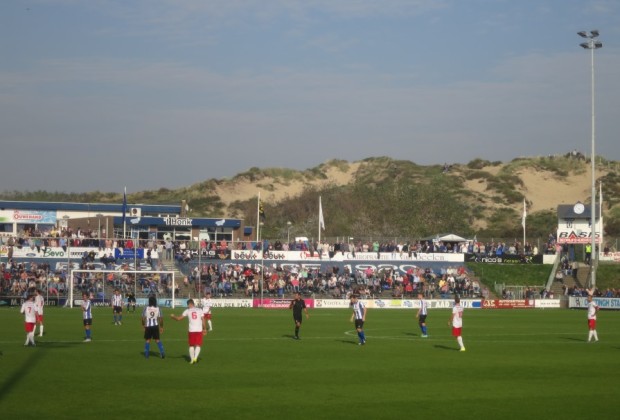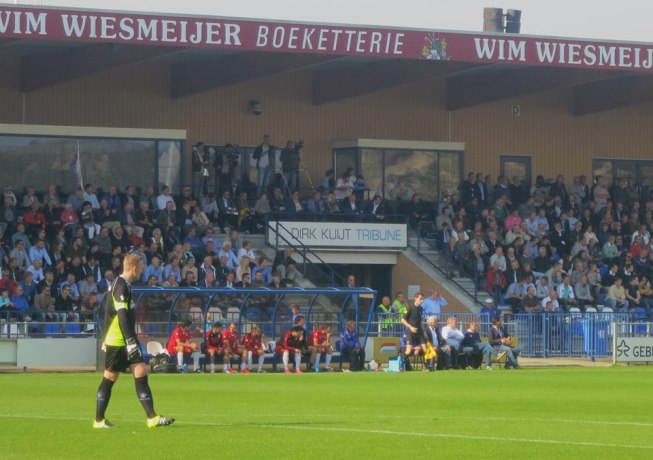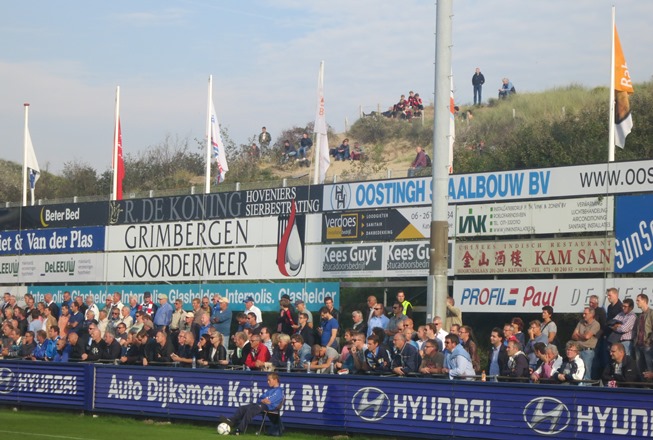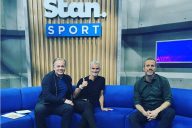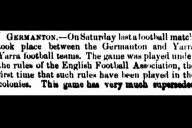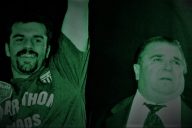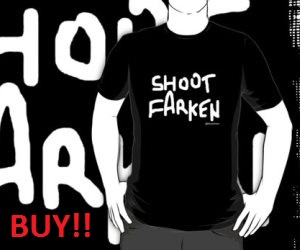I took the bus from Leiden to Katwijk. Crowds filled the streets: amusement rides, fried food stalls, donut stalls, games machines, a ferris wheel filled the sides of roads. The Dutch had defeated the Spanish in 1574, keeping them out of Leiden and ending the 80 years war. For their efforts the people of Leiden were awarded a University by the King. Each year, October 3 is celebrated with free concerts along the Nieuwe Rijn, the Oude Veste, at the Pieterskirk and along the streets leading to the main train station. This proudly gentrified, slow, quiet, scholarly town becomes raucous, drunken, and er, to use a German word, kitsch. This is the embodiment of Bahktin’s carnivalesque: it is a legitimate day on which to upturn the natural order of things. The streets become strewn with plastic beer cups, vomit stains the footpaths, upright and brisk gaits dissolve into crooked, twisted stumbling forwards. Now and then a citizen, perhaps an unaware foreigner, unknowing of the mayhem that the date October 3 brings out in Leidenaars, finds him or herself hapless amongst the heavy-breathing, shouting drunkards. I would have otherwise stayed at home and battened down the hatches, waiting for the storm to pass, but, one of the local derbies – Quick Boys (of Katwijk) vs Noordwijk (of neighboring Noordwijk) was scheduled for 3pm. A dose of local football in the afternoon away from the slowly building chaos unfolding in Leiden town.
The sun shone brightly down on the Quick Boys home ground. Early October and the sun still making its presence felt: not an afternoon to take for granted. And perhaps this was one of the reasons for the healthy crowd. Local Katwijkers arrived hurriedly by bicycle. With less than five minutes to official kick-off, the bicycle parking zones were well and truly over-flowing; the car-park, too, was full. On the neighbouring pitches junior games were being played; but there was little interest. Two queues had formed at the ticket box: I waited for ten minutes. A woman sold programs for 50 Euro cents; having only a €20 note, I didn’t trouble her for the change. A seat in the stand was €9, a staanplaats (standing room) was €7.50. I chose the latter in part out of displeasure at the uniformity of all-seater stadiums while also thinking that €7.50 was already a little on the pricey side for a fourth division match. Quick Boys play in the Hoofdklasse, the highest level of amateur football, but their facilities and pitch are good enough to be used by the national Dutch team for their preparations before major tournaments. The surprising weather had caught the crowd off-guard. Many had heavy jackets on, others were in t-shirts. The usual sense of fortifying oneself against the elements had been dispelled with in favour of a more carnivalesque and cheerful atmosphere.
Quick Boys was the first club of Dirk Kuyt, before he left for Utrecht, then Feyenoord, then Liverpool, then Fenerbahce, then back to Feyenoord and perhaps, one day back to Quick Boys. And thus there is the Dirk Kuyt Tribune, which on this day was as good as packed. The tiered benches too behind the Northern End goals were mostly full. It was from here that the most intense support came for Quick Boys. There was no flag waving, no banners and no chanting: but much shouting, cheering, jeering, whistling, gasping. Over on the Dirk Kuyt Tribune, the youngsters (jongens) had folded up the team posters and were banging them unceasingly on the sets. Unceasingly until the 30th minute, at least. Fans unwilling to pay the 7.50, or perhaps those just passing by and stopping for a moment on an afternoon’s walk, had set themselves up on a dune that overlooked the ground. A kind of natural tribune in less crowded circumstances. I went to the southern end of the ground, where there was no tiered seating and it was only half-lined with spectators. I could take my place at the edge of the penalty box and watch unhindered in relative space and quiet. The terraces along the Western wing were three-quarters full. The Noordwijkers had positioned themselves at one end, but there was no formal separation and no over-bearing presence of security. Few Katwijkers wore club colours; only a couple of scarves here and there. It was only the juniors, having finished their games, that ran around in Quick Boys tracksuits.
Noordwijk led at half-time thanks to a smartly hit volley inside the penalty box from a corner kick. The players ran off to the other corner flag and celebrated in front of no one in particular; their own fans were on the opposite side. The Katwijkers shouted their displeasure at the goal. The half-time whistle indicated that it was hot-dog time; and the burly men in jeans shuffled towards the stalls. Those at the sunny North End made their way to the shadey South End where Quick Boys would be attacking. A brass band emerged from underneath the Dirk Kuyt Tribune and entertained the Katwijk elite and VIPs. The band didn’t set foot on the pitch, nor did the trundle down our end or the far end to entertain the masses. A familiar and favourite tune was played prior to the referee emerging with the teams and those in the stand shouted wordlessly along with it. Noordwijk kicked-off the second half, after what seemed like an extra-long pause. Their attacker standing proud with this foot holding the unmoving ball in place. Now, next to me, I had some proper Quick Boys fans, tall and blocking my hitherto unhindered view into the southern penalty box: it was almost like being in a crowd.
A goal was not forthcoming for Quick Boys. The gentlemen next to me became increasingly agitated. The man immediately to my left particularly so. He had a range of methods to express his displeasures at the game. These were roughly as follows – and my interpretations being limited to my minimal Dutch language.
(1) Sarcastic interaction with opposition players. For example, after an opposing player claimed the ball was not out (and thus not a corner), he shouted at the player that it was ‘meters, kilometers’ out. Hahahaha.
(2) Condemnation of the lack of skill of their own players. This can also be sarcastic, but, he also gave direct coaching advice about where to pass the ball. And when a pass failed Jesus was invoked: a slight surprise to hear this in a community that is routinely described as being ‘very religious’ and part of the Dutch Catholic bible belt.
(3) An exasperated flicking of his hand or fingers on the horizontal metal bar that we lent against. He would use no words while doing so, only a stifled ‘fu…’, as he had already exhausted himself from earlier negative comments.
(4) A banging of the advertising boards in front of the metal bar. This was a broad piece of metal, probably about 15cm wide, with which he could create significant volume. Words or shouting were not necessary. And, then after Noordwijk scored their second goal in the 74th minute, off in the far distance of the North End, he turned around and left in a huff, angrily stating his disgust to his mates, who at least seemed like they were going to stick it out. I had seen enough and thought I would try my luck and catch the early bus back to Leiden.
I had a 40 minute wait on my hands during which time I watched the crowd cycle and drive out of the surrounding streets. My presence at the bus stop inspired some to shout at me; perhaps it was clear that I wasn’t a local. This bout of shouting was no surprise; I had heard of people throwing stones at cyclists who had dared to ride through the city on a Sunday. Moreover, those doing the shouting were safely in a car and driving away. The bus arrived and we made a slow and tedious journey back to temporarily Carnivalesque and Grotesque Leiden. I navigated a path back to my little apartment via the edges of the chaos. If I didn’t find it too bothersome, too annoying, too much of an intrusion into daily life, I can’t help but think it is because I’ve been around Leiden a little longer than I realise.
Probably by next September, I’ll be looking forward to it.
Andy Fuller writes on football and urban culture. He lives in Leiden, The Netherlands. His website is readingsideways.net

